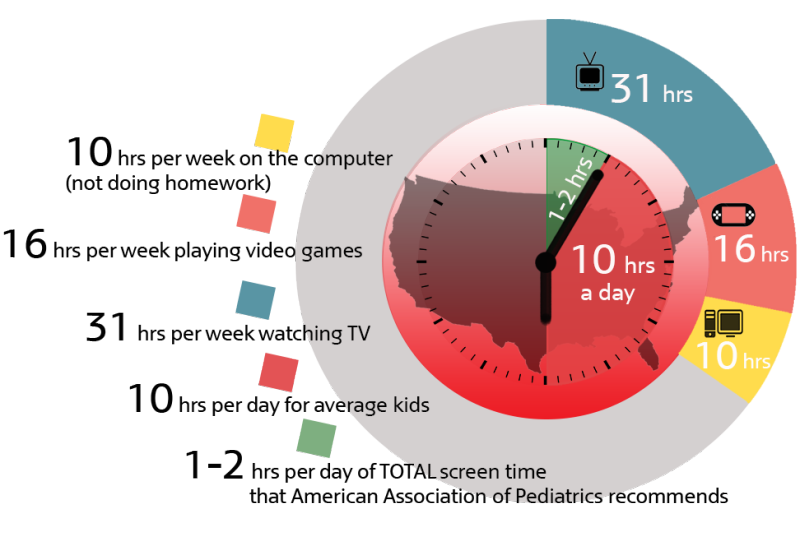Study links screen time to bad behavior, offers parent solution
The graph indicates how much screen time children of the nation get per week.
April 10, 2014
People might not notice, but a majority of peoples’ days are spent in front of some type of screen, ranging from cell phones to computers and TVs. The impact of too much screen time can result in bad health habits, aggressive behaviors, and/or poor performance in school.
Douglas Gentile, associate professor of psychology, led a study that primarily focused on how limiting screen time will offer multiple benefits for children.
“Parents are in more control than they think,” Gentile said. “They don’t notice the bad side effects.”
Gentile and a large team studied over 1,300 families, teachers and school nurses for the 2008-2009 school year in Cedar Rapids and Lakeville, Minn.
Gentile and researchers surveyed the families with multiple questions and had the school nurses fill out sheets that answered questions about the students.
After a few years of analyzing and processing the data and going through the publication procedure, the team was ready to release the findings of their study.
The study discovered that there was a ripple effect, which is associated with the benefits of parents limiting screen time. Parents who took control and limited screen time found that children were getting more sleep, doing better in school and had a lesser chance of obesity.
In addition, when parents controlled the content of what their children watched and heard, the children’s behavior was less aggressive and they more prone to cooperate with others easier.
According to the American Association of Pediatrics, they recommend no more than one to two hours of total screen time per day. Not including schoolwork.
“The average kid spends about ten hours a day in front of a screen,” Gentile said. “That’s more than half of their day wasted.”
Gentile said that on average, 31 hours per week are spent watching TV, 13-16 hours playing video games and 10 hours a week on the computer per person.
“Parents’ involvement with media completely has beneficial or negative effects,” Gentile said. “They need to be more aware of how they spend their time.”
Gentile said parents should co-view with their children, watching TV with them and instead of voicing their opinions about the show, ask them questions. For example, “why was that said that way?” or “why was it shown this way?” Otherwise, kids believe silence is approval.
Gentile and his team were able to see a difference in the children’s health, academic performance and behavior.
Rachel Reimer, an assistant professor in the master of public health program at Des Moines University also contributed analyzing and concluding the data.
Reimer worked with Gentile since she was a graduate at Iowa State. Together, they worked on multiple elements of this study.
“This study is important because it documents the effects that parental monitoring of media can have on such a range of physical, social and academic outcomes,” Reimer said.
Reimer and others believe if children have excessive amounts of screen time and or if their caregivers do not monitor what they are watching, the more negative outcomes there will be.
“Parents have more of an influence than they may believe,” Reimer said. “Limiting screen time for children, and consistently monitoring their media habits is hard work, but the benefits are clear and compelling.”







